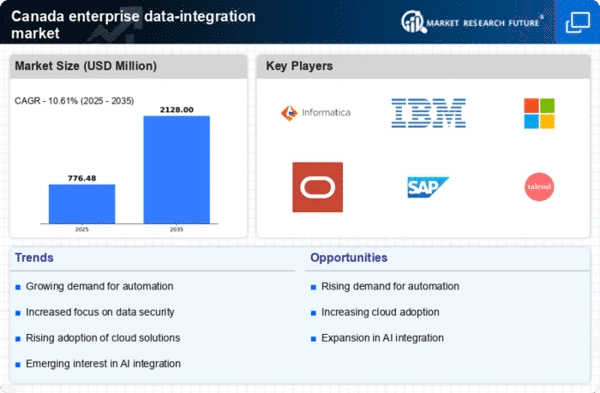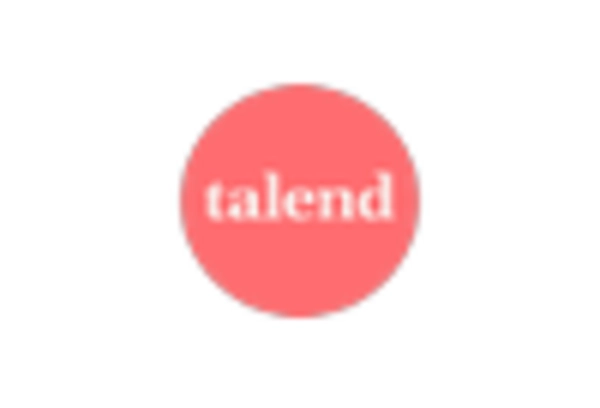Growth of Big Data Analytics
The rise of big data analytics is a pivotal driver for the enterprise data-integration market in Canada. As organizations accumulate vast amounts of data, the need for effective integration solutions becomes paramount. Businesses are leveraging data integration tools to streamline the analysis of big data, enabling them to uncover trends and patterns that inform strategic decisions. Reports indicate that the big data analytics market in Canada is projected to reach $2 billion by 2026, which in turn is likely to boost the demand for data integration solutions. This interplay between big data and data integration is fostering innovation within the enterprise data-integration market.
Emergence of Hybrid IT Environments
The shift towards hybrid IT environments is reshaping the enterprise data-integration market in Canada. Many organizations are adopting a combination of on-premises and cloud-based solutions to optimize their IT infrastructure. This hybrid approach necessitates effective data integration strategies to ensure seamless data flow between different environments. As businesses seek to leverage the benefits of both cloud and on-premises systems, the demand for integration solutions that can operate across these platforms is increasing. Current estimates suggest that over 50% of Canadian enterprises are implementing hybrid IT strategies, which is likely to drive growth in the enterprise data-integration market.
Regulatory Compliance and Data Security
In Canada, the enterprise data-integration market is significantly influenced by the need for regulatory compliance and data security. With stringent regulations such as the Personal Information Protection and Electronic Documents Act (PIPEDA), organizations are compelled to ensure that their data integration processes adhere to legal standards. This has led to an increased focus on secure data handling and integration practices. Companies are investing in solutions that not only facilitate data integration but also enhance security measures. It is estimated that around 60% of Canadian enterprises are actively seeking data integration solutions that prioritize compliance and security, thereby propelling growth in the enterprise data-integration market.
Rising Need for Data-Driven Decision Making
The enterprise data-integration market in Canada is experiencing a notable surge due to the increasing emphasis on data-driven decision making across various sectors. Organizations are recognizing the value of integrating disparate data sources to derive actionable insights. This trend is particularly evident in industries such as finance and healthcare, where data accuracy and timeliness are critical. According to recent statistics, approximately 70% of Canadian businesses are prioritizing data integration initiatives to enhance operational efficiency and improve customer experiences. As a result, the demand for robust data integration solutions is expected to grow, driving innovation and investment in the enterprise data-integration market.
Increased Adoption of Artificial Intelligence
The integration of artificial intelligence (AI) technologies is transforming the enterprise data-integration market in Canada. Organizations are increasingly utilizing AI to enhance data processing and integration capabilities. AI-driven solutions can automate data integration tasks, improve accuracy, and reduce the time required for data preparation. This trend is particularly relevant in sectors such as retail and telecommunications, where rapid data processing is essential. It is estimated that AI adoption in data integration could lead to a 30% reduction in operational costs for Canadian businesses, thereby driving further investment in the enterprise data-integration market.
















